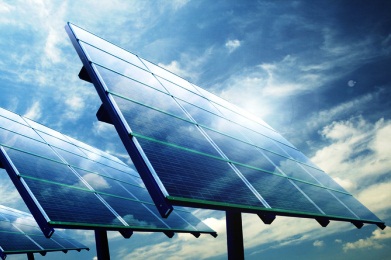By Anmar Frangoul, CNBC
Could a crowdfunded solar power campaign help solve Greek energy problems – and add a spark to the country’s economy? Environmental pressure group Greenpeace, which claims the troubled country’s dependence on imported fossil fuels is “one of the most unacknowledged causes of the Greek crisis” believes so.
At the end of July, Greenpeace activists staged a protest on the island of Rhodes, in the Aegean Sea. They unfurled a 600 square meter banner with the message ‘Oil is fueling Greek debt’ emblazoned across it, pointing it towards an oil fired power plant currently under construction.
“Rhodes has an energy shortage problem, and it’s funny, because Rhodes has been called the ‘island of the sun’, and it has this tremendous solar potential,” Takis Grigoriou, climate and energy campaigner for Greenpeace Greece, told CNBC in a phone interview. “All this has been ignored and there’s this new power plant that’s going to burn oil that is being built right now in Rhodes,” Grigoriou added.
The protest marked the start of a crowdfunding campaign that Greenpeace hopes will draw attention to a natural resource that Greece possesses in abundance: sunshine.
“What we’re saying, basically, is (that) in these very difficult times for Greece what the country ought to be doing is utilising its best and greatest asset: the sun,” Grigoriou said.
“The sun can really help the country turn to sustainable growth,” he added.
Greece is heavily dependent on oil, with the International Energy Agency (IEA) reporting that in 2012 it accounted for, “some 45 percent of the country’s total primary energy supply (TPES).” The IEA also notes that, “Almost all the crude oils used in Greece are imported.”
The majority of this is imported from former Soviet Union countries as well as the Organization of Petroleum Exporting Countries (OPEC). In June the Greek government signed a preliminary agreement with Russia that would see the two countries co-operate on a pipeline that would export Russian gas to Europe through Turkey and Greece.
Hydrocarbons are becoming increasingly important to Greece’s energy security. Greece’s Ministry of Foreign Affairs has stated that, “There is particular emphasis on hydrocarbon exploration in Greece, as the country endeavours to develop its domestic resources in an effort to enhance its own energy security and that of the wider region.”
Only this month, Greece signed a memorandum of understanding with Venezuela – which has nearly 300 billion barrels of proven crude oil reserves, according to OPEC – regarding further cooperation in the energy sector. The country also wants to become a “transit hub” in the natural gas sector.
Grigoriou pointed to what he called a “solar power spring” between 2009 and 2013, when the Greek government focused on solar power, but said that, “instead of continuing this development the government brought (it to) an abrupt end.”
“We’re spending billions on energy imports,” Grigoriou said, before adding, “It’s like throwing this money into a black hole… it’s really compromised any sense of economic recovery, we shouldn’t be doing that (when) we have all this huge potential of renewable energy, not only sun but wind, geothermal, hydro.”
According to Greenpeace, an estimated 6 in 10 Greek homes, “are struggling to pay their energy bills.”
The Indiegogo campaign, which is using the hashtag #SolarizeGreece, has set what Grigoriou described as a “symbolic” target of raising $1,000,000 by the end of September, with Greenpeace saying that funds raised will be used to, “install as many solar panels as possible onto households that live on the brink of energy poverty.” The campaign has so far raised more than $15,000 in just over two weeks.
The project will be a continuation and extension of previous solar power installations on Rhodes. In 2014 Greenpeace installed solar panels in two households, while in 2015 solar panels and heat pumps were installed at a shelter for orphans.
“Greece has a huge renewable energy potential,” Grigoriou said. “If only it could utilise that potential, it could be (beneficial) in turning the country to sustainable growth. We want energy to be part of the solution, not the problem.”









